#Goddess of retribution
Photo
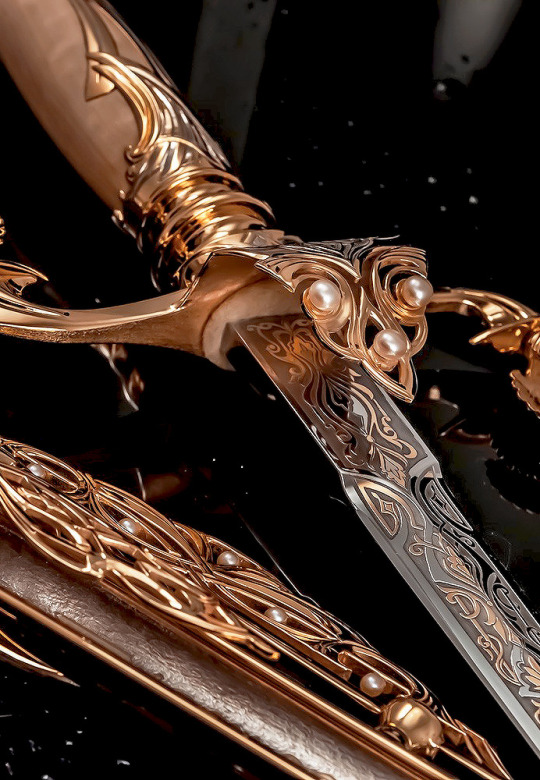
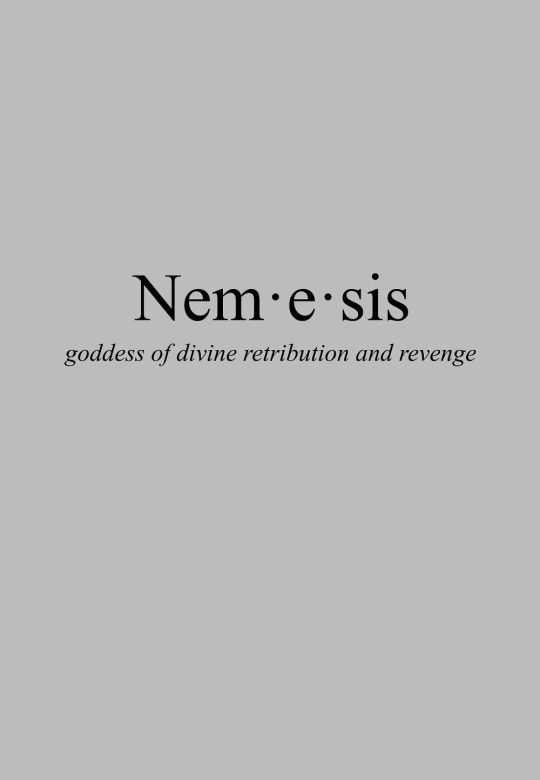

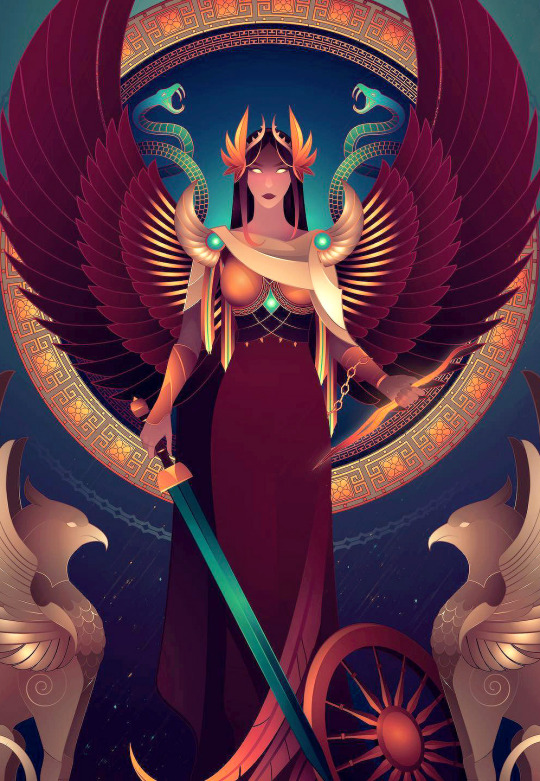
The Evermore Grimoire: Greek Mythology
Nemesis (νεμεσις meaning ‘to give what is due’) was the goddess of divine retribution and revenge in Greek mythology. She would show her wrath to any human being that would commit hubris (arrogance before the gods). Nemesis was also a remorseless goddess, and was frequently portrayed as a winged goddess wielding a whip or even a dagger. In one myth she enacted divine retribution on Narcissus for his vanity. After he rejected the advances of the nymph Echo, Nemesis lured him to a pool where he caught sight of his own reflection and fell in love with it, eventually dying. However she was also known as Adrasteia, meaning ‘The Inescapable,’ or the ‘Goddess of Rhamnous’ in recognition of her famous temple in the city Rhamnous.
artwork by Yliade
#MythEdit#MythologyEdit#FYeahMyths#FantasyEdit#Greek Mythology#Goddess of Retribution#Nemesis#Goddesses#My Edit
722 notes
·
View notes
Text
Coolest thing on my trip has been today when we went to Hieropolis (?) in Türkiye and I got to do some oracle readings for our group (right next to the temple of Apollo!!!)


#me#Apollo#I volunteered and got to be priestess ¯\_(ツ)_/¯#it was so cool and very funny since this a group of older Christian folks#one of the pastors was wary of this and lol he got one that was very positive and could be interpreted in a xtian way so he was happy#they said I should go into radio because I had a good broadcasting voice#mainly I’m posting about it bcus I don’t want to forget#the guide let folks pick a card and each one coresponded with a reading#the only gods that were name dropped were tyche (goddess of good luck) and nemesis (goddess of retribution)
12 notes
·
View notes
Text
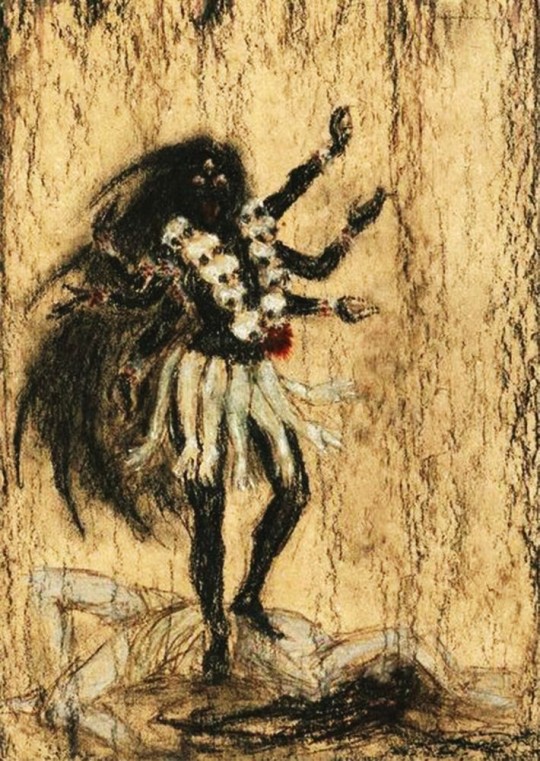
Maha Kālī, Mother of All Destruction and Retribution.
15 notes
·
View notes
Text
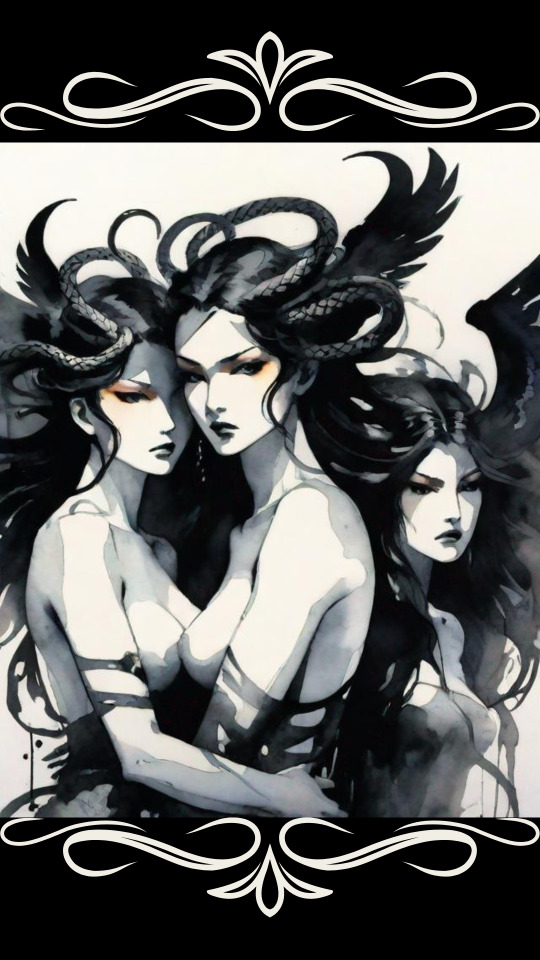
The Furies, in Ancient Roman mythology, were three sister goddesses that inhabited the underworld, and inflicted retribution against those who have committed crimes against morality or the gods
#the furies#fates and furies#female furies#furies#vengance#divine retribution#retributive justice#roman empire#roman mythology#roman gods#roman goddess#underworld#ai artwork#mythology and folklore#classical mythology#mythology#mythological#ancient roman mythology#ancient rome#ancient religion#pagan gods#paganism#roman paganism
5 notes
·
View notes
Text
nate is a child of nemesis and sophie is a child of aphrodite and parker is a child of hermes and hardison is a child of haphaestus and eliot is a child of apollo and no i will not be elaborating on this one you just need to trust me
#caroline talks#leverage#but bc i am annoying: nate as a child of the goddess of retribution might sound heavy-handed but COME ON. this is Nate we’re talking about.#sophie is a child of Aphrodite bc something something charmspeak and sometjing about. like. love is messy and violent and don’t besmirch it#Parker is a child of Hermes bc look at her.#hardison is a child of haphaestus bc LOOK AT HIM. I also think he’d be the one coolest about it#just like ‘oh. neat. anyways moving on—’#Eliot is a child of Apollo but in a way to purposely annoy his godly parent#ie. archery. does not like archery bc does not like any weapon that you need to take aim with#also apollo is apparently supposed to look out for the passage of boys to manhood.#and boys would cut their hair apparently as a sign to honor Apollo.#see Eliot: refuses to cut his hair
7 notes
·
View notes
Text
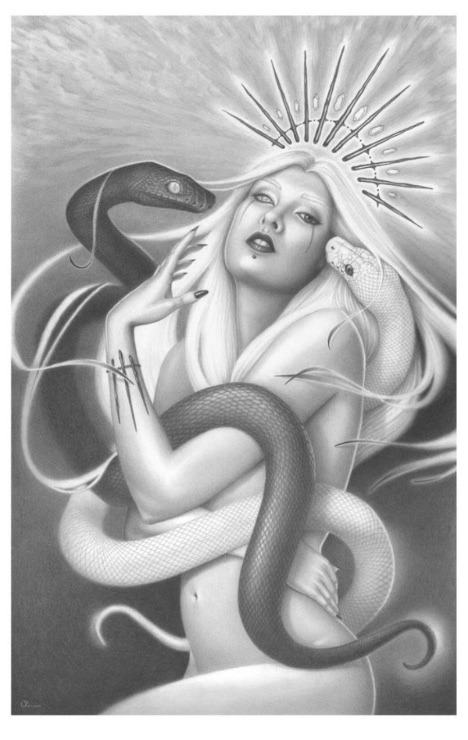
This is Lyssa
She is the Goddess of Rage, Anger and Black Magic.
#demonology#demon#black metal#deity#goat#herbs#my soul for his glory#witches' sabbath#demon goat#demons#goddess#witches#witch#black witch#black magic spells#spells#destruction#retribution
5 notes
·
View notes
Photo
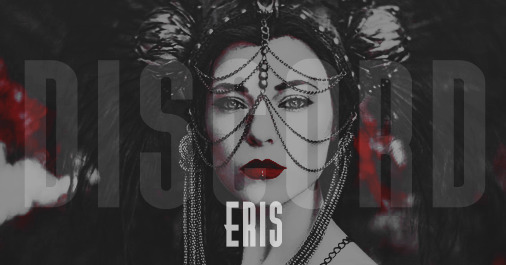
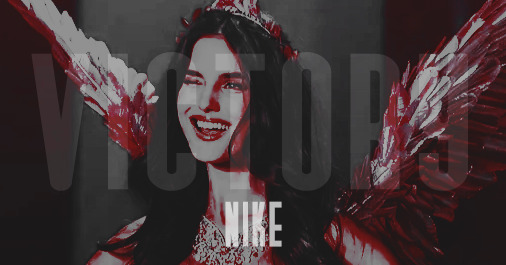

May You Win Your Chaotic Revenge.
#greek goddess#hellenistic#hellenic pantheon#eris#nike#nemesis#discord#strife#victory#winning#revenge#retribution#vegeance
26 notes
·
View notes
Text
ah, the foreshadowing Ned drops
“They’d need to be manufactured” and yes, it was, by the handsomest pirate king who ever was
#twenty thousand leagues under the sea#20000 leagues under the sea#voyage of the nautilus#HE’S COMING. THE HOTTEST MAN IN VICTORIAN LIT.#god I’m just very gay for the nemesis of empire lately huh#again. the man invented a whole language. he’d have to be aware of the possible etymological connection#between his chosen name and the goddess of divine retribution.
9 notes
·
View notes
Text
Oh please. After everything you did, a little searing agony is the least you deserve.
#audio logs: aisling gallagher#the ghostbusting paper towel tube#//ooc: the goddess-of-retribution blood is coming out i see-
3 notes
·
View notes
Note
* chatting * "Uncle Bezo" * chatting *
* chatting * "Uncle Bezo" * chatting *
* chatting * "UNCLE BENZOOOO!!!!!!!! " * chatting *
I think you captured how Benzo's life is in just about every one of my AUs.
Poor dude is destined to suffer (mildly) for his friends choices.
#Arcane#Benzo Arcane#Ramblings of the Goddess#Q and A with the Goddess#Anon Question#And if Silco's accepted the kids as his own#(or you know they are his own)#Benzo knows there will be some form of retribution#if he's seen as being mean to the kids#Although can he really be that mad about a bunch of adorable niblings?
4 notes
·
View notes
Text
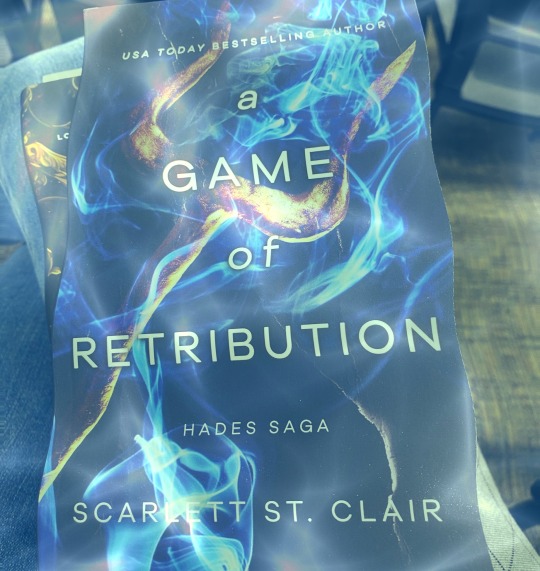
So beyond excited for the new addition to the best Hades and Persephone series ever written and to finally get to meet Scarlett St. Clair! Definitely won’t be getting any sleep tonight with this one! Lord Hades will always have my heart🖤
#game of retribution#a touch of darkness#atod#ator#atom#scarlett st clair#hades and persephone#lord hades#persephone#goddess of death#the underworld#god of the underworld
2 notes
·
View notes
Text

Goddess of Justice and Retribution, it is the role of Nemesis to inflict retribution for crimes committed against the Gods.
0 notes
Text

If ATOD Persephone worked from home and was sending Hades selfies 🖤💓
Happy Halloween everyone!
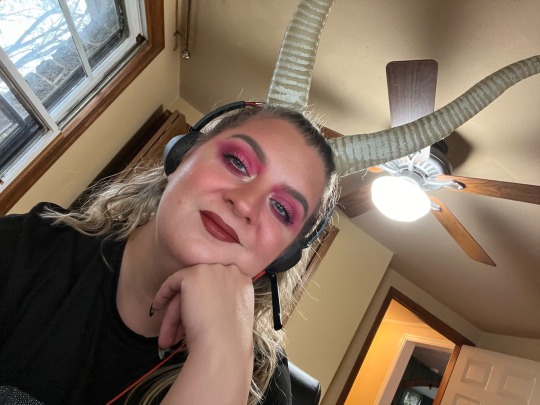
#atod#a touch of darkness#Persephone#scarlett st clair#cosplay#selfie#Halloween#goddess of spring#Queen of the underworld#bookblr#booktok#a touch of ruin#a touch of malice#a game of fate#a game of retribution#hades#hades x persephone
1 note
·
View note
Text
((Hey, there’s a new percy jackson book coming out soon.
Who wants to write the pjo au with me to celebrate
#the twins are the kids of nemesis#greek goddess of retribution#I have reasons for this#but also like team strq meeting at camp half blood#after qrow and raven were rescued from a triumvirate band of assholes#just IMAGINE#i would accept Ozpin as being an older camp councilor#or a cryptid friend of Chiron#just like. Think of it
0 notes
Text


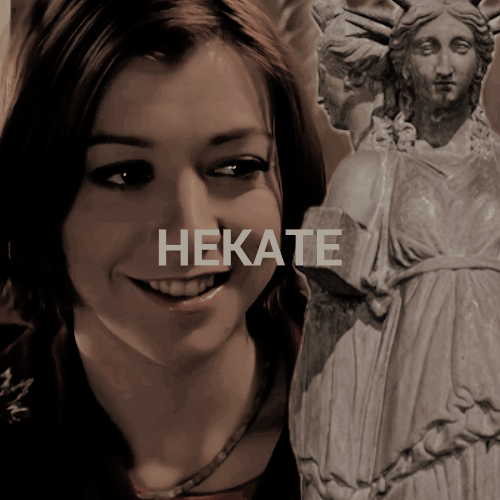
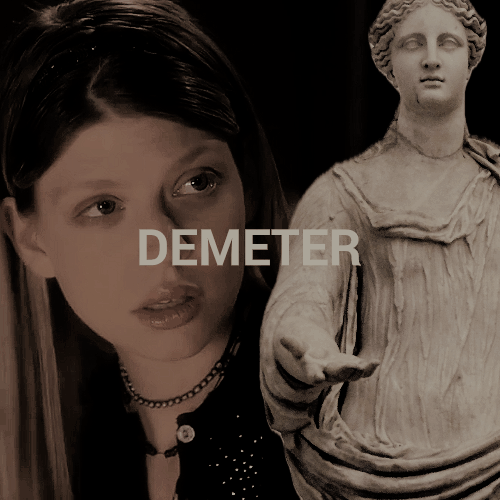
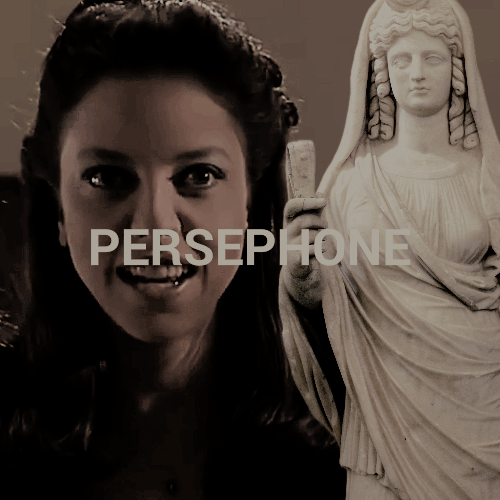





ೃ⁀➷ Buffyverse Women as Greek Goddess
Buffy // Athene
ATHENE (Athena) was the Olympian goddess of wisdom and good counsel, war, the defence of towns, heroic endeavour, weaving, pottery and various other crafts.
Dawn // Iris
IRIS was the goddess of the rainbow and the messenger of the Olympian gods.
Willow // Hekate
HEKATE (Hecate) was the goddess of magic, witchcraft, the night, moon, ghosts and necromancy.
Tara // Demeter
DEMETER was the Olympian goddess of agriculture, grain and bread who sustained mankind with the earth's rich bounty.
Drusilla // Persephone
PERSEPHONE was the goddess queen of the underworld, wife of the god Haides (Hades).
Darla // Hera
HERA was the Olympian queen of the gods, and the goddess of marriage, women, the sky and the stars of heaven.
Faith // Artemis
ARTEMIS was the Olympian goddess of hunting, the wilderness and wild animals. She was also a goddess of childbirth, and the protectress of the girl child up to the age of marriage.
Anya // Nemesis
NEMESIS was the goddess of indignation against, and retribution for, evil deeds and undeserved good fortune.
Cordelia // Aphrodite
APHRODITE was the Olympian goddess of love, beauty, pleasure and procreation.
Fred // Hestia
HESTIA was the virgin goddess of the hearth (both private and municipal) and the home.
#mine#my post#btvsedit#atsedit#btvs#ats#angel the series#buffy the vampire slayer#buffy summers#dawn summers#willow rosenberg#tara maclay#btvs drusilla#btvs darla#ats darla#faith lehane#anya jenkins#cordelia chase#winifred burkle#ats fred
376 notes
·
View notes
Text
When The World Is Crashing Down [Chapter 1: Am I More Than You Bargained For Yet]

Series summary: Your family is House Celtigar, one of Rhaenyra's wealthiest allies. In the aftermath of Rook's Rest, Aemond unknowingly conscripts you to save his brother's life. Now you are in the liar of the enemy, but your loyalties are quickly shifting...
Chapter warnings: Language, warfare, violence, serious injury, a brief history of burn treatments, alcoholism/addiction, references to sexual content (18+), a wild Sunfyre appears, catching feelings for literally the single most inappropriate man on the planet.
Series title is a lyric from: "7 Minutes in Heaven" by Fall Out Boy.
Chapter title is a lyric from: "Sugar, We're Goin' Down" by Fall Out Boy.
Word count: 5.3k.
Link to chapter list (and all my writing): HERE.
💜 I’m going to tag like a bazillion people since this is the first chapter of a new fic, but I WILL NOT TAG YOU AGAIN unless you ask me to. I hope you are all doing well, wherever you are in the world! 💜
@doingfondue @catalina-howard @randomdragonfires @myspotofcraziness @arcielee @fan-goddess @talesofoldandnew @marvelescvpe @tinykryptonitewerewolf @mariahossain @chainsawsangel @darkenchantress @not-a-glad-gladiator @gemini-mama @trifoliumviridi @herfantasyworldd @babyblue711 @namelesslosers @thelittleswanao3 @daenysx @moonlightfoxx @libroparaiso @burningcoffeetimetravel-fics @mizfortuna @florent1s @heimtathurs @bhanclegane @poohxlove @narwhal-swimmingintheocean @heavenly1927 @echos-muses @padfooteyes @minttea07 @queenofshinigamis @juliavilu1 @amiraisgoingthruit @lauraneedstochill @wintrr13 @r0segard3n @seabasscevans @tsujifreya @helaenaluvr @hiraethrhapsody @backyardfolklore
Let me know if you’d like to be tagged in future chapters!
You scream when he grabs you, this lightning strike of a man with a grip like an animal trap that splits bones. He pulls you away from the soldier you’re soothing—a young dark-haired Norcross, disoriented, doomed, his intestines spilling out onto the grass and blood on his lips—and through the forest of smoke and corpses and pine trees. Your eyes sting and water, your boots snag on gnarled roots. When you yelp and stumble to the earth, the man drags you upright again. You struggle like a beast with a blade at its throat, cold, serrated, pressure on the jugular. You shove and scratch at him, trying to plant your boots in soil strewn with gore and glowing embers.
“Stop, stop it, you’re hurting me!”
“Hurry up.”
“You’re going to break my wrist—!”
He wrenches you around to look you full in the face, and only now do you know who he is. A gasp hisses through your teeth; the acrid air in your lungs vanishes. Every muscle and tendon and ligament of you is taut with horror, tight enough to snap. It’s like meeting one of the Seven, the Warrior or Stranger or Smith, a shade you know only from myths and nightmares. It’s like being led to the executioner’s scaffold. His long silver braid hangs over one shoulder. His eyepatch conceals the childhood maiming that left him half-blind. There’s blood and ash on his scarred face, a ruthless breed of fear in his remaining eye, icy blue, creek-shallow, soulless. The man clasping your wrist is Prince Aemond Targaryen. “I’ll break your neck if you don’t come with me now.”
He does not wait for your protest or acquiescence. You couldn’t give it anyway. Your muddied boots move numbly as he tugs you forward, this man they call Aemond One-Eye, a monster, a murderer, a kinslayer. The earth is littered with carnage from the battle, charred ribcages and disemboweled horses, scattered armor and severed limbs. Ashes fall from the smoldering treetops like dark snow.
What does he want from me?
Rape seems unlikely; everyone knows Prince Aemond’s deviancies do not run in that direction. He is cold, hateful, dispassionate, made of stone. He does not lust for anything but power and retribution, fire and blood.
To kill me?
But why not do it here, now? There is a sword hanging from his belt, a dagger in one fist. There is no reason to wait.
To take me prisoner? To feed me to his dragon? To torture me for information?
Surely there are more knowledgeable people around to torture. What use could you be, a healer, a woman? Unless…
Unless he knows who my father is.
You glance down at the fabric band looped around the upper half of your right arm, the only mark you wear of your house, stark white banner, skittering red crabs. It is soaked through with blood. It is unreadable.
Someone is shrieking, but not like a dying man. He has too much fight in him for that, too much glass-clear agony, unwanted blistering consciousness. He screams like someone being flayed, gutted, burned alive. You’ve only ever heard this sound once before. You choke on the greasy, putrid, metallic sweetness of scorched human flesh as it sears down your throat, not knowing if it is real or remembered.
There is a tent in the midst of the pine trees, fluttering canvas that’s green like emeralds or jade. The wind is picking up; you will need to evacuate soon. The cinders will spread and the forest will blaze. Somewhere a dragon is roaring, wounded and mournful like the cry of a lost child. The screams of the man grow louder; they fill your skull like a fever, scalding and senseless and red. Aemond yanks the tent flap aside and pulls you in. And when you breathe it is nothing but the sickening miasma of burnt flesh, coppery blood, suffering, sweat, ruin.
He’s writhing on a wooden table, the man the Greens call king. It has to be him: white-blond hair down to his shoulders, blue eyes and fine aristocratic bones. Two ancient, shaky-handed maesters—hastily commandeered from the defeated House Staunton, you assume—confer nearby, clutching glass bottles of milk of the poppy. A man in armor is cutting tatters of clothing from the so-called king. When he lifts the fabric away, skin sloughs off with it. Aegon wails, struggles, begs him to stop. Aemond goes to his brother and carves away scraps of melted leather and charred cotton with the swift blade of his dagger.
“Shh, shh, don’t fight us, we’re trying to help—”
“Aemond, let me die,” the burned man rasps. He is trembling violently, he is half-mad with pain. Meleys’ flames claimed a swath of his right cheek, his neck and chest and back, his arms down to his wrists, his belly to the crests of his hip bones. “Please. I don’t want to be here. I don’t want it to hurt anymore. Don’t try to help me. Just let me die.”
Aemond looks back at you. “Can you treat this?”
He thinks I’m a Green, you realize with panic, with relief, with terror. And of course he would: you had wandered into the Greens’ side of the battlefield and therefore did not surrender or flee or die with the other Blacks, you were tending to a Green soldier when he found you. Aemond the Kinslayer would not comprehend the notion of service to humankind without a line drawn down the middle of it, of uncategorical compassion.
“Can you help him or not?!” Aemond shouts; and you know that he is not just afraid but shattering, spider-leg cracks inching across a window or a mirror. Perhaps the Greens have souls after all.
You shed your paralysis like daylight erases the stars and approach to examine the so-called king. You do not touch him; still, he whimpers, sobs, quakes like waves in a storm. “He needs more milk of the poppy. A lot more of it.”
“Yes,” Aegon agrees immediately. His streaming eyes—a bleak, murky blue like the sea off Claw Isle—list to you, agonized and grateful.
The maesters gape. “More could kill him,” one says. And they are petrified of being blamed for it. They are plagued by visions of Aemond hacking off their heads and displaying them on spikes above the stone walls of captured Rook’s Rest.
“No drawbacks at all then?” Aegon manages between moans.
“If his pain does not abate, he will die of shock,” you say. “He must be unconscious.”
“Knock me out,” Aegon pleads, pawing at Aemond. “Tell them, tell them.”
Aemond looks to the man in armor: dark-haired, olive-skinned, Dornish. Sir Criston Cole, you realize. The Hand of the King. The Kingmaker. After a moment, Criston nods. “Do it now,” Aemond orders the maesters.
Grimacing, grim, they pour the opalescent liquid into Aegon’s mouth. He gulps it down as quickly as he can. “Enough,” you tell the maesters. Instinctively, you reach out to comfort Aegon: a palm rested lightly on his forehead, fingers threaded through silvery hair that’s filthy with soot and blood. You should hate him, but you don’t. When you look at the Greens’ broken king, you cannot see a murderer, a usurper, a depraved hedonist, a consumer of innocence. You can only see a man worn threadbare by ill-advised bravery.
“Hello, angel,” Aegon murmurs as he gazes up at you, a ghost of a smile on his lips. His eyes really do remind you of home: ocean currents like iron, fog like flint. “Welcome to the end of the world.” And then he’s out, extinguished, eclipsed.
Servants bustle into the tent carrying heavy buckets. “What is that?” you ask.
“Pork lard,” one of the maesters says. “For his wounds.”
“No, no, no, some of these burns are nearly down to the muscle. They’re too deep, too fresh. Lard is for later, to help with scarring, although olive oil or rose oil would be better. He needs to be cleaned with vinegar diluted with water. Or red wine, if that’s all that can be found.”
“Vinegar?!” one of the maesters exclaims.
“It helps prevent infection. Nobody knows why.”
The same maester turns to Aemond, imploring him. “My prince, I can assure you, the Citadel recommends pork lard or cow dung as topical cures, or both used alternatingly. There are also reports of cases where frogs have been helpful, warmed in oil and then rubbed on the affected area.”
Criston blinks. “I’m sorry, you do what with the frogs…?!”
They’re going to kill him, you think. Not with malice, but with stupidity. A wasted life, a wasted death. You demand of the maester: “When was the last time you treated burns this severe?”
He glowers at you, sharp dark eyes like flecks of onyx in a nest of wrinkles. And you know you’ve won when he replies: “When have you?”
“My brother was burned in a housefire started by an upturned lantern. It was five years ago, but I remember the direness his injuries. And what was done to save him.”
Silence in this tent the color of summer: green grass, unsinged trees. Aemond waits for the maesters to produce some astute rebuttal. When they cannot, he orders the servants: “Vinegar, water, rags. Now.” They dash off to oblige him, wide-eyed and quivering like small dogs. Then Aemond looks to you. “What next?”
“His wounds should be treated with honey and then bandaged. The dressings must be changed frequently, at least once per day. He must be repositioned so the scar tissue does not immobilize his joints. He will suffer, it cannot be avoided, but he should suffer as little as possible. Listen to him when he says the pain is too much. Let him sleep. When he is awake, he must drink plenty of fluids. He is losing water through his burns, and it must be replaced. Milk is preferable. Tea and fruit juices are good as well. Some wine is acceptable if that’s what he likes best.”
“And it certainly is,” Criston mutters. You’ve heard the same: that the Greens’ king is a drunk, an adulterer, a coward, a ghoul. You cannot speak to any of this. You know him only as someone who is horrifically pained and sick to death of fighting. Again, without thinking, you comb your fingertips distractedly through his hair as he lies unconscious on the table, bleeding from everywhere. He’s so young, so breakable, so unlike the monster you’ve been led to believe he is.
“Get honey and bandages,” Aemond tells the maesters. They depart, casting each other incredulous glances: Are these our new overlords? Men who heed the wisdom of impetuous young women filthy with blood and earth?
“I’ve heard salt can be helpful for wounds,” Aemond says. “They used it on me when…” He gestures to his eyepatch, to his scar. Lucerys Velaryon took that part of him in self-defense; at least, that is what you have always been told. But you’ve read enough to know that for every event, there are at least two stories. Whatever the truth is, Luke paid for that eye. He paid, Rhaenyra paid, the world continues to pay the price over and over again.
“Because it dries. It absorbs moisture.” You skim your palm over Aegon’s forehead, without lines of fear or anguish as he sleeps. There is a ring on his left hand, a gold dragon with glinting dots of jade for eyes. You twist off the ring so it will not hinder circulation as his fingers swell and give it to Aemond. “But burns weep as they heal. They need to be wet. If they get too dry, they will crack open and fester.”
“Is that what happened to your brother?” Aemond asks.
“Where we did not pay enough attention. The backs of his knees, the soles of his feet.”
“But he survived.”
“Yes,” you tell Aemond; and you can see how desperately he is searching for hope in your face, your words. “He did.”
The servants return with buckets of water, handfuls of rags, glass bottles of vinegar that is cloudy and rust-colored.
“What’s it made from?” you say.
“Fermented a-a-apples, my lady,” one of the boys sputters. He watches Aemond out of the corner of his eye like sheep look for the shadows of wolves. He shivers, he sweats. This boy, who last night was fetching meat and mead for Lord Staunton, has heard the same stories you have: the degenerate king, his murderous brother.
“That’s fine then.” You haul over one of the water buckets and Criston helps you lift it up onto the table. You empty half a bottle of vinegar into the water, mix it by wobbling the bucket back and forth, and then soak a rag in the pungent liquid. “You can help,” you tell Aemond and Criston. “Dip a rag in the bucket, wring it out, then press it to his wounds. Remove any dirt or scraps of fabric. But don’t rub. Try not to damage the skin he has left.” You demonstrate: dabbing at flesh that is torn and bloody and blistered, a black-and-ruby wasteland that at best will leave him irreparably scarred and at worst will swallow his life like ships sink in storms.
Tentatively—with hands at ease with killing but not tenderness—Aemond and Criston join you, studying your movements and imitating them with great care. There is a sniffle, a teardrop that falls onto Aegon’s filthy but unburned left hand and glistens there like a splinter of glass; you are alarmed to see that the Kingmaker is weeping.
“Criston,” Aemond says gently. “We are doing everything we can for him.”
“Since the day he was born, I promised…”
“I know.”
“Your mother…”
“I know,” Aemond says again, and you think: The Greens aren’t demons, they aren’t savages. They’re just patchworks of memory and flesh and suffering, the same as any of us. “He will live. And his sacrifice won us a victory today.”
As you tended to wounded men caked with blood and pine needles, you saw them tangled above in the overcast sky, scales of scarlet and gold and an ancient muddy viridescence. There were flames and shouts, and then all three dragons hurdled towards the earth and out of view. “The Red Queen?” you ask Aemond, mindful to keep your voice perfectly level.
“Dead,” he says: dark satisfaction, fearsome pride. “And so is her rider.”
“The gods are good.” You are amazed at how easily it slips out, a reflex of self-preservation while your mind is elsewhere. Does my father know yet? Does Rhaenyra, does Daemon, does Corlys? People will be searching for you soon. If you do not appear from the smoke and chaos of the battlefield, your eldest brother Clement will come looking with his sword in hand. Everett, scarred and unagile but clever, will be pouring over maps to see where you might have ended up.
There is no suspicion in Aemond’s face when he glances over at you. He is gingerly cleaning soot and charred strips of ruined skin from Aegon’s chest, which rises and falls in deep, slow breaths. “Which family is yours?”
House Celtigar, but you can’t tell him that. You scramble for a noble family of the Crownlands whose accent you share, whose history you have been taught, whose men fight for the Greens but are not so distinguished that Aemond will know them well. “House Thorne.”
He nods. “Are you one of Sir Rickard’s sisters?”
You startle. Perhaps you have chosen the wrong disguise. “Far less illustrious than that. Just a cousin.”
The two maesters return, their archaic hands piled high with linen bandages and glass jars of honey, a fiery gold like sunset. “Set them down over there,” Aemond orders, pointing. He has a presence, it cannot be denied. He is tall, fierce, swift yet calculated. He moves like a man who has killed once, twice, again until it is no longer something that keeps him awake at night. It is something that has become a part of him like arteries or bones. “Prepare a room in the castle.”
“For Prince Aegon?” one of the maesters says, then quickly corrects himself. “I mean, for the king?”
“For until we decide what to do with him.” Aemond stares at Criston. Criston stares back, his dark eyes huge and shiny. There is a war to be waged, but Aegon will not be able to help them. Not for months, at least. Not ever, if he dies. The maesters disappear again, grumbling to each other. Unwelcome tasks, unwelcome guests.
Rhaenys is dead, you think as you work. It doesn’t feel real. Meleys is dead. Hundreds of Black soldiers are dead. Rook’s Rest is the Greens’ greatest victory yet, and one they desperately needed. This war is nowhere near over. And the betting odds keep changing.
You say to Aemond and Criston: “Help me turn him. We must clean the burns on his back as well.”
They listen, they obey, they help you because helping you means helping Aegon. When he is washed as well as he can be, you spread a thin sheen of shimmering honey over his wounds—an amber river that will trap moisture and discourage inflammation—and wrap him in bandages. The only burn you leave uncovered is the one on his right cheek. It creeps up over his pale face like red tentacles, curling and grasping, hungry, insatiable. They match now, you think. Two brothers, two scars.
Criston assembles a group of Green soldiers and Aegon is carried in a litter to the castle that serves as the seat of House Staunton, once allies of Rhaenyra, now traitors, now dead men walking. Outside rain has begun to fall, putting out flames born from dragonfire. The pine forest is saved; wounded men lie in the dirt with their mouths open hoping to quench their thirst. By the time Aegon is placed in an opulent bedroom with a view of Blackwater Bay, he has already bled through his bandages. You clean him again, bandage him, dribble milk of the poppy down his throat when he begins to stir and whimper. Aemond gives you command of a makeshift fleet of caretakers: the two requisitioned maesters, three maids, servants to bring food, drink, bandages, wood for the crackling fireplace.
My family is searching for me, you know as you battle to save their enemy’s life, this maybe-king with silver hair and eyes like deep water.And then: I cannot leave him. Not now, not yet.
In the night, as cool rain patters against the ocean and Aemond and Criston are slaughtering House Staunton men down in the castle courtyard, you dose Aegon with milk of the poppy every few hours. The maesters refuse to take responsibility for it; if the king is poisoned, it will be you who swings from a rope for it. You hold cloths dripping with cold water to his forehead. You feed him nibbles of bread and venison when he is conscious enough to eat, cinnamon tea, pomegranate juice, goat milk. You inspect him for any signs of infection. You braid a small lock of his hair before you’ve stopped to consider why you’re doing it.
And when no one else is watching, you untie the bloodstained armband of your own house and burn it to ashes in the fire.
~~~~~~~~~~
Someone is jostling you, grabbing at you. You fell into an exhausted, sporadic sleep in the next room long after midnight. It’s morning now; warm sunlight blooms like flowers on your face, yellow roses and buttercups and daffodils. When your eyes open, they are sore and unfocused. Aemond is a blur of white hair and black leather. He is tugging on you again, his lithe fingers like a vice around your forearm.
“Stop it, get off me!” You shove him away. He waits, bemused. “You can’t keep dragging me around like this!”
“Why not?”
Because my father is one of the wealthiest men in the Seven Kingdoms. Because I may not have silver hair or a dragon, but if you cut me open the blood of Old Valyria would spill out like red waves. Because the man I am pledged to marry is good at killing, very good at killing, maybe even better than you. “Because I’m a noblewoman. I’m a lady.”
“You don’t act like one,” Aemond counters. “Ladies flee from blood and gore. Ladies are nowhere to be found on battlefields.”
“I like being useful.”
“Then I have brought you a gift. You are needed now. Aegon is asking for you.” And then, when you hurry out of bed, finding your footing on chilly wood floors: “Well, that certainly got you moving quickly.”
“He’s in pain?”
“Not especially, from what I can tell. I think he just wants you.” Aemond glides out of the bedroom. You follow him to Aegon’s chamber. The Greens’ king is propped up in bed on a great mass of pillows, bandaged, limp, eyes glazed and barely open. There are men huddled around him. You recognize Criston, though not the other ones, some old and some young and all in armor. You hope that none of them are Sir Rickard Thorne.
You feel Aegon’s forehead for fever. To your relief, he is no more than modestly warm. He catches your hand, holds it tightly, doesn’t let go. After a moment’s hesitation, you sit down beside him on the edge of the bed. There is a curl of his lips, just a whisper of a smile, just a phantom of one. Aemond glances at you and Aegon with mild interest, then turns his attention to Criston.
“Aegon,” Criston informs the king, patiently, like a good father would. “We have to move you back to King’s Landing.”
“No,” Aegon says. His voice is so low and weak that he’s difficult to hear.
“Your recovery will be long and arduous,” Criston explains. “Aemond and I will be needed in combat. We cannot stay to guard you. The Blacks may try to retake Rook’s Rest. You staying here is not an option. King’s Landing is safer. It is well-supplied, it is protected. And we have our own maesters there who will help tend to you.”
“Can’t leave,” Aegon croaks. “Sunfyre.”
“Aegon—”
“I can’t leave without Sunfyre,” he forces out with immense effort. Then he gasps and moans, tears pooling in his eyes. You offer him milk of the poppy; he guzzles as much as you’ll allow him to have.
Criston sighs. “You can’t stay. And Sunfyre can’t leave. One of his wings was nearly ripped off, he’ll never fly again. We have no way to transport him, he’s too heavy.”
One of the armored men mutters: “And that’s assuming he wouldn’t incinerate anyone who ventured close enough to try.”
“Where is he now?” Aemond asks the man.
“Down on the beach, my prince. Eating dead soldiers.”
Criston shudders. Working in close proximity to dragons has not given him a liking for them.
“Can’t leave him here,” Aegon whispers, shaking his head.
“You must,” Aemond says.
“What if it was Vhagar?”
“I’d leave her. I’d have no choice.”
Aegon frowns, squeezing his eyes shut. It’s all too much for him. “Not the same.”
No, perhaps not; Aemond’s dragon may be the largest and most lethal in the world, but Aegon’s bond with Sunfyre is said to be what legends are built of, words written in ink and stone. You watch the agonized confliction on Aegon’s drawn face: can’t leave, can’t stay, can’t fight, can’t run. You say softly: “Could Sunfyre be assigned a detachment of guards?”
Aemond looks at you as if just remembering you’re here. “What?”
“Men could be tasked with ensuring the dragon is secure and fed. From a safe distance, of course. They could report on his health. Then perhaps when he is stronger, he can be reunited with the king.” The king. Again, it stuns you how easily the treason rolls out, like waves bubbling over rocks and sand.
Aemond turns to Criston. “Could it be done?”
“I don’t foresee many men volunteering for the task. But it could be done, yes. Sure.”
Aemond asks his brother: “Would that make a difference?”
Aegon’s eyes drift to you. They are churning with sluggish, clunky thoughts, heavy burdens to bear on raw shoulders. The braid that you wove absentmindedly into his hair is still there. “Alright,” Aegon agrees at last. “I’ll go.”
“Good,” Aemond says. “We leave at dawn tomorrow.” Then he looks to you. “You will come south with us.” His tone invites no argument. He doesn’t even conceive of it as a possibility. Why would you refuse? Why would you, a purportedly devout Green, shy away from the opportunity to nurse your king back to health? You bow your head in compliance. You wonder what is being discussed in the Black Council; you wonder what your father is thinking, what Everett believes happened to you.
“But I have to see him first,” Aegon says.
Aemond does not understand. “See who?”
“Sunfyre.”
“But you can’t walk to the beach,” Criston says. “You can’t walk anywhere.”
Aegon grins, showing his teeth. His dazed, deep blue eyes glitter mischieviously. His hand has not disentangled itself from yours. “Then carry me.”
The deal is struck, like a face minted onto a coin or a bolt of lightning meeting the earth. Soldiers transport Aegon down to the stony, mist-sopped shoreline. Blade-sharp agony is flooding back into his face, but he refuses more milk of the poppy. He wants to be awake when he gets there. He wants to be himself.
The soldiers cannot get too close to Sunfyre; no one besides Aegon can. He is helped off the litter and then tries to amble across the wet, grey sand. After a few steps he collapses. You rush to him, dodging Aemond and Criston’s grasps as they try to stop you.
“No,” Aegon says when you attempt to help him to his feet. He is panting from the pain, his face flushed with torment and exertion. His white-blond hair whips in the wind. “Do not follow me. Not even if I pass out, not even if I’m dead. I don’t know what Sunfyre would do to you.” And then he crawls forward alone on his hands and knees.
Waves crash, spraying saltwater into the air. Crabs scuttle over rocks. Gulls swoop low to claim mouthfuls of flesh from bloated corpses in worthless uniforms. The dragon known as Sunfyre the Golden is curled up on the beach. Many of his metallic scales are singed; the pink membranes of his wings are tattered like lace. His right wing hangs at a ruinously odd angle. You would know how to set that if he was a human. And you could do it without the threat of being reduced to ash and history.
Sunfyre unravels as Aegon nears him, long angular face rising, frayed wings settling by his sides. You have seen dragons before, of course—Syrax, Caraxes, Arrax, Vermax, Meleys—though never from this close. They horrify you. You cannot look at them without thinking of the devastation they sow like a plague, of how they so unmistakably no longer belong in this world.
Sunfyre’s head stretches out towards his rider, a half-dead man kneeling in wet sand and wearing only bandages and loose cotton trousers. Beside you, Sir Criston Cole sucks in a noisy, nervous breath. Aemond watches Aegon, his face like stone. His hair hangs in long, damp waves.
Aegon embraces Sunfyre, clinging to him, resting his face against the dragon’s. They stay like that for what feels like a very long time. Then Aegon crawls back to you, sobbing with pain by the time he is lifted into the litter. You give him milk of the poppy and he accepts it eagerly. He is unconscious again within seconds. Down the beach, Sunfyre looses a soft desolate cry like a plea: Don’t go. Don’t leave me. You might never come back.
~~~~~~~~~~
The drivers have been instructed to proceed slowly and with caution; still, the carriage pitches and jolts as you traverse the Rosby Road towards King’s Landing. In addition to the caravan’s most precious cargo—the Greens’ fragile and intermittently sentient king—it transports also two severed heads: Lord Simon Staunton’s in a basket, and Meleys’ in the bed of a mule-drawn wagon. High above in slate-grey clouds, Aemond and Vhagar are safeguarding your progress. Criston rides on a monstrous warhorse just outside the carriage. You are leafing through a book that you found in the castle library at Rook’s Rest: anatomy, surgery, sicknesses and cures. Aegon is bandaged and heavily medicated in the cushioned seat across from you. While servants flit in and out frequently, you are the only passengers in the carriage at the moment. You do not know that Aegon is awake until he speaks.
“Sinful,” he says. His voice is groggy, only half-here. He is gazing blearily at the illustration on the open pages of your book: a quite detailed naked man, his arteries and veins mapped like the roads of Westeros, his cock bare and sizeable.
“It’s informative,” you reply in your own defense, smiling.
“My father would have hit me for looking at something like that. If he’d noticed.” Aegon smirks, resting his head against the back of his velvet seat. His hair has been scrubbed and rinsed by servants, the braid you made for him undone. “He probably wouldn’t have noticed.”
“Mine has a great love for all books.” Bartimos Celtigar is eternally turning pages: computations, records, revenue. He does not just sit on Rhaenyra’s council. He is her Master of Coin. He funds her war effort, he fuels her like wood to a fire. “Besides, I have seen naked men in person. No book can scandalize me now.”
A little twitch of his silvery eyebrows: fascination, amusement. “He does not lose sleep over your spent innocence?”
“He has other things on his mind presently.”
“Like what?”
Like helping Rhaenyra win the war. You find a different truth to tell him. “Some men consider one daughter to be too many. My father has four. His attention is thoroughly divided.”
“He doesn’t like you?”
“He likes me plenty. He just doesn’t need me.”
Aegon nods. His eyes travel over you slowly and meditatively, not leering but learning, memorizing slopes and angles, taking you in like he’s never been able to before. He is in the brief lull between doses of milk of the poppy: lucid enough to speak but not so much that he can feel the full extent of his injuries. “Are you married?”
This is a bit of a fraught subject. “I am betrothed.”
“Oh,” he says, with what might be disappointment. “And he wouldn’t rather have you home right now? Putting all that knowledge of male anatomy to good use? That’s difficult to believe.”
You peer evasively down at your book. “He has a role to play in the war. I’ve been given permission to serve in my own way until it is over.”
“Permission,” Aegon echoes. He finds this interesting. He studies you for a while before he asks, his voice gentle: “What’s wrong with him?”
“Nothing. He’s honorable, he’s brave. He’s marvelously formidable. He could carry you around like a sack of potatoes.”
Aegon chuckles, a slow reflective laugh, curiosity, intrigue, something to think about besides the fact that he’s missing half his skin. “Do you fear marriage?”
What is the answer to that question? Do you even know yourself? “I fear being possessed. And having no remedy if the circumstances are not to my liking.”
“You can’t get one of your three superfluous sisters to marry him instead?”
You smile faintly. “No, we’ve met. He chose me, he favored me. I’m not sure why.”
“Probably because you’ve read all there is to know about cocks.” Aegon grins, drowsy and crooked and playful. “Who is he?”
“Just a man,” you say. You can’t tell Aegon more than that. It would give your Black affiliations away.
You are betrothed to the Warden of the North, Lord Cregan Stark.
#aegon targaryen x you#aegon targaryen ii#aegon ii#aegon targaryen x reader#aegon x reader#aegon ii targaryen#aegon targaryen#aegon targaryen ii x you#aegon ii x y/n#aegon ii x you#aegon ii x reader#hotd fanfic
673 notes
·
View notes